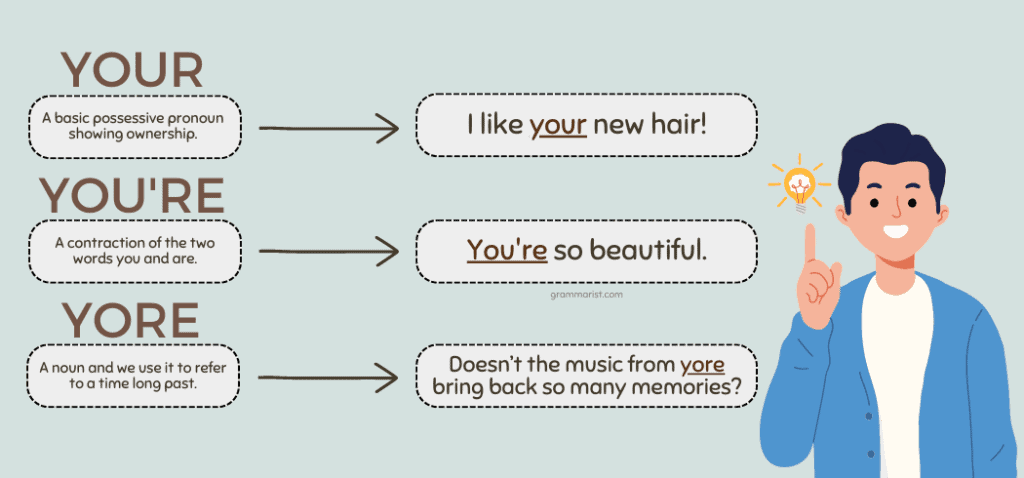Grammar can be confusing, especially when it comes to homophones like your, you’re, and yore. These three words are constantly mixed up in writing, even among seasoned writers. In speaking, it doesn’t matter because they’re homophones and sound exactly the same.
But it’s crucial you get them correct when in written form. I’ll show you some tricks to remember the difference.
Difference Between Your, You’re, and Yore

Let’s start with the basics. “Your” and “you’re” are both pronouns but have different meanings. “Your” is a basic possessive pronoun showing ownership, like your laptop or your home.
But “you’re” with the apostrophe is a contraction of the two words you and are. You could say, “You are beautiful” or “You’re beautiful.”
And now we have the word “yore.” This is a noun, and we use it to refer to a time long past, like the days of yore.
What’s the Definition of Yore?
“Yore” is a noun we sometimes use to refer to a time that’s long past. It’s like a poetic way of saying old days, as in when kings and queens ruled or during medieval times. It is derived from the Old English words geāra and geāre, which mean former times.
How Do You Spell Your?
Well, if you just mean the simple possessive pronoun, then it’s y-o-u-r. But if you mean the contraction of you and are, then it’s y-o-u-‘-r-e, and -y-o-r-e if you need to refer to olden times.
When to Use Your and You’re
Try your best to avoid creating confusion between “your” and “you’re.” I know it’s hard, but you just have to understand their respective uses.
Use “your” when you’re referring to something that belongs to someone. Here’s an example: “Is this your dog?” also means “Does this dog belong to you?”
When using “you’re,” just remember it’s a contraction of you and are. “You’re the best!” or “You are the best!” are exactly the same.
Is Yore a Valid Word?
Yes, absolutely! “Yore” is definitely a valid word in the English language, but it’s not often used in everyday conversation unless in a joking way. You’ll find it more in literature or poetry, where it’s used for its poetic and nostalgic connotations.
Sentence Examples Using Your

- Can I borrow your pen, please?
- I love your new haircut; it suits you so well!
- Is this your first time visiting the city of Halifax? I have to show you around!
As your body’s control centre, your brain keeps your heart beating, lungs breathing and lets you move, feel and think. (The Mirror)
Sentence Examples Using You’re
- You’re so talented to be able to write and illustrate all your own books.
- I can’t believe you’re leaving already; it feels like you just got here.
- You’re going to love this new restaurant. My cousin is the chef here, and he’s been cooking all over the world.
Sentence Examples Using Yore
- In the days of yore, knights roamed the land on horseback and defended their ruler.
- Doesn’t the music from yore bring back so many memories?
- Back in the yore of my childhood, things were much simpler than they are today.
You’re Writing About Your Days in Yore
Don’t feel bad if you still get these three homophones mixed up; everybody does. But hopefully, my guide helped you understand the differences. Bookmark it so you can always refer back to it when you’re unsure!
